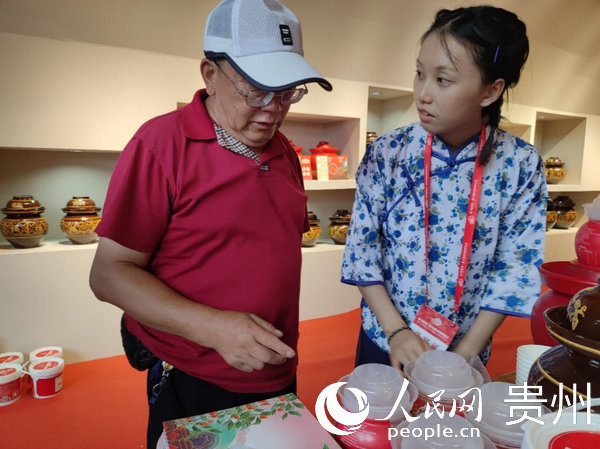Chili Peppers Become 'Hot' Commodity Driving a Prosperous Industry in Zunyi, China's Guizhou
In southwest China's Guizhou Province, an industrial chain with chili peppers at its center has emerged to include seedling cultivation, chili pepper planting, processing, trade, research and development (R&D), and tourism, among other sectors.
A total of 1.4 million households in Guizhou's rural regions have discovered that chili pepper planting can be a major source of income for them. The planting area for chili peppers in Guizhou has already exceeded 5.43 million mu (362,000 hectares) and 311 chili pepper processing factories in the area have seen robust growth.
 |
| Representatives from companies check on the growing progress of chili peppers at an intelligent chili pepper industry park in the Xinpu New District, Zunyi city, southwest China's Guizhou Province. [People's Daily Online/Li Liping] |
Nowadays, chili peppers have become one of the 12 characteristic industries in Guizhou, and in the meantime thanks to chili pepper expos, which are held on a regular basis, more and more enterprises from both home and abroad have started to pay more attention to and invest in the chili pepper industry in Guizhou, helping the province in its drive to bring common prosperity to its rural residents and boost rural revitalization.
"In the past, after harvesting chili peppers, people would keep the seeds of high-quality chili peppers and choose not to buy chili pepper seeds for the next ploughing season. Now, they have to buy seeds before the ploughing season arrives," said Liao Weiqin, a researcher from the chili pepper research institute of the Zunyi Agricultural Sciences And Technology Research Institute, attributing this change to the cultivation of new varieties of high-quality chili peppers.
Since a seed improvement project was started in 2013, Zunyi city has developed the Zunyi red cluster pepper, which is recognized as one of the best chili pepper varieties in China. In the meantime, over 50 chili pepper varieties of superior quality have been cultivated in the city.
Zunyi has also built a service system surrounding the seed industry. At an intelligent chili pepper industry park located in Xinpu New District of Zunyi, seeds of nearly 1,000 high-quality chili pepper varieties are displayed every year, and the best seeds will be selected, planted and promoted there.
 |
| Photo shows chopped chili pepper products for sale. [People's Daily Online/Li Liping] |
The city also established a technical service team in its Xinpu New District to facilitate chili pepper planting. Based on their experiments in the fields and analyses at labs, the scientific researchers have promoted the seeds among growers by following the standard that requires all seeds distributed to farmers to be of the same variety, with the seedlings being provided to farmers while managed and transplanted in a unified manner. "The chili pepper growers can receive skills training and technical assistance at every link of their chili pepper cultivation," introduced Liao.
Zunyi has built a chili pepper seed breeding scientific research center, a chili pepper seed processing base and a chili pepper seedling breeding center, among other facilities, offering technical support in enhancing the market competitiveness of locally grown chili peppers. At present, the coverage of high-quality chili peppers at large-scale plantations has reached 100 percent, with over 80 percent of the seedlings being bred in a unified manner.
The chopped chili pepper in Guizhou is the soul of Guizhou cuisine and a seasoning used in the dishes of other culinary cultures in China.
"Our chopped chili pepper products have sold very well in Hunan Province in central China, and Sichuan Province and Chongqing Municipality in southwest China. They are even popular in countries in Southeast Asia," said Wei Xiaoliang, director of operations at a food processing company in Guizhou.
"Chopped chili pepper products in Guizhou are fermented, which are different from those from other provinces, which are preserved," Wei explained.
The use of traditional fermentation techniques and the fact that no additives are contained in the chopped chili pepper products are the core "selling points" for Guizhou's chopped chili pepper products.
"About two to three years ago, our chopped chili pepper products started to enter the market. But as a matter of fact, we had been engaged in R&D for six years," said Chen Rongqing, president of the same food processing company.
 |
| Citizens buy chili pepper products at an expo. [People's Daily Online/Li Liping] |
Over the course of six years, the company analyzed and carried out research on the techniques adopted by more than 100 local elderly craftsmen who were making chopped chili peppers. In addition to learning from these elderly craftsmen, the company in the meantime constantly improved its techniques regarding the making of chopped chili pepper products. At present, chopped chili pepper products from the company are used as a seasoning in dishes provided by more than 800 restaurants in Guizhou.
Covering an area of 605 mu, China's "Chili Town," located in the Xinpu New District, Zunyi, provides a smooth channel for the trade of chili peppers. Last year, the transaction volume completed at Chili Town exceeded 80 billion yuan ($11.6 billion). Nowadays, this Chili Town is home to 25 dried chili pepper trade companies, 14 cooperatives and 210 individual businesses, selling chili pepper products to localities across the country and even to 108 countries and regions around the world.
During the seventh Guizhou Zunyi International Chili Expo held in late August 2022, cooperation agreements on 44 projects regarding chili pepper production, processing and sales were signed, with a total value of 2.1 billion yuan.
(Source: People's Daily Online)
Please understand that womenofchina.cn,a non-profit, information-communication website, cannot reach every writer before using articles and images. For copyright issues, please contact us by emailing: website@womenofchina.cn. The articles published and opinions expressed on this website represent the opinions of writers and are not necessarily shared by womenofchina.cn.






.jpg)

 WeChat
WeChat Weibo
Weibo 京公网安备 11010102004314号
京公网安备 11010102004314号